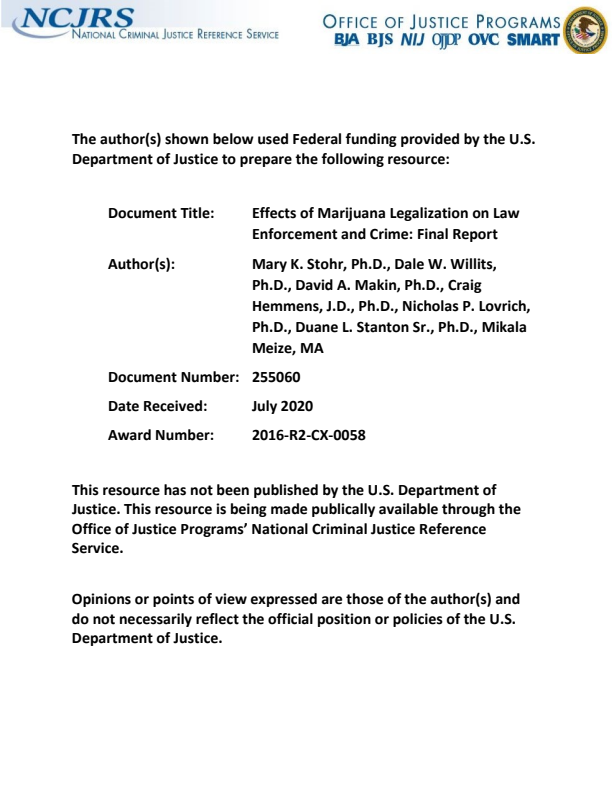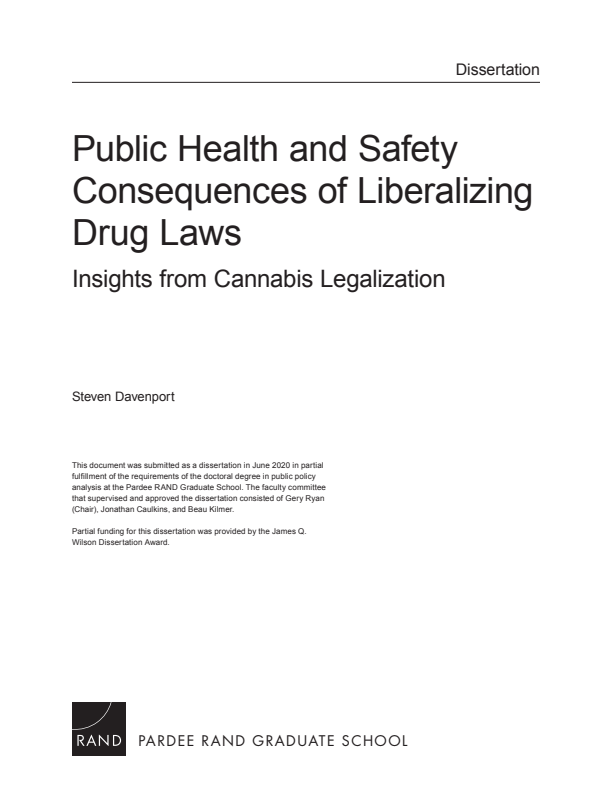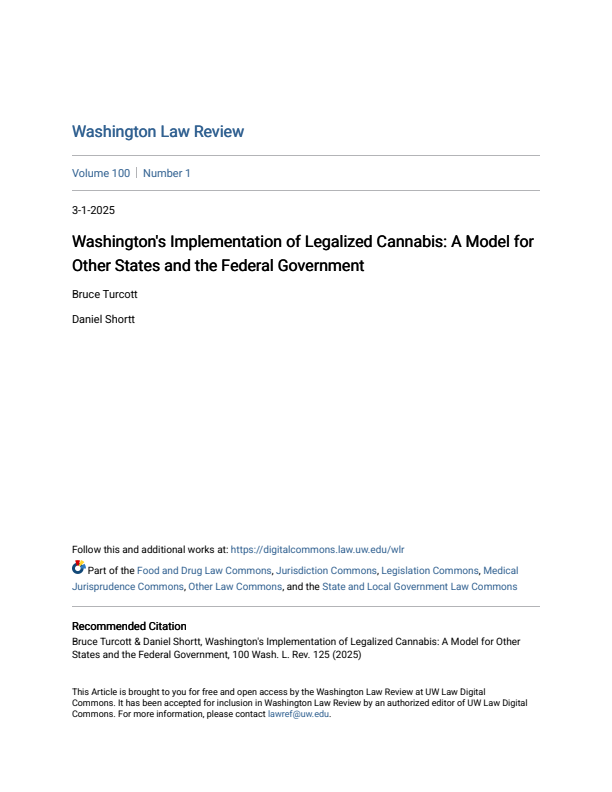Mary K. Stohr, Dale W. Willits, David A. Makin,. Nicholas P. Lovrich, Duane L. Stanton Sr., Mikala Meize
In 2012 the citizens of Washington State, via Initiative 502, legalized possession of a small amount of cannabis by adults. On July 1, 2014 licensed retail outlets in Washington opened with a regulated and monitored product. The effects that this legalization would have on crime and law enforcement in the state were open questions. In this National Institute of Justice-funded study we employed a mix of quantitative and qualitative approaches geared toward addressing these questions. Research partners and participants included municipal, county, state and tribal law enforcement agencies representing 14 state, urban, suburban, rural, and tribal organizations in Washington the neighboring state of Idaho, as well as law enforcement professionals from 25 additional agencies and organizations. Focus group, joint, and individual interviews involved 153 justice system officials that included sworn officers from three multi-agency drug task forces and one gang task force. In addition, face-to-face interviews included prosecutorial representatives, officers from the Washington State Department of Fish and Wildlife, and instructors from the National Association of State Boating Law Administrators. We constructed case study profiles and assessed qualitative (focus groups, interviews) and quantitative (Uniform Crime Reporting Program or UCR, calls for service records, and body/dash camera footage) data regarding how police practices and strategies, and crime itself, have been affected by legalization in Washington, and how that watershed decision in Washington has changed policing in adjacent border areas. We engaged a number of doctoral students and more than a dozen undergraduate students in the work of analyzing the data collected from the field and archival records sources. We found that marijuana legalization has not had an overall consistently positive or negative effect on matters of public safety. Instead, legalization has resulted in a varied set of outcomes, including: concern about youth access to marijuana and increased drugged driving, a belief that there is increased cross border transference of legal marijuana to states that have not legalized, reports that training and funding for cannabis-related law enforcement activities have been deficient given the complex and enlarged role the police have been given, and the persistence of the complex black market. On the “positive” front, legalization appears to have coincided with an increase in crime clearance rates in several areas of offending and an overall null effect on rates of serious crime. Importantly, the legalization of marijuana has reduced the number of persons brought into the criminal justice system by non-violent marijuana possession offenses. The police were also greatly concerned about how to best handle the detection and documentation of marijuana-related impairment in both commercial vehicle operations and traffic incidents. The state has adopted the Target Zero goal of no traffic fatalities by 2030 and the legalization of marijuana and the privatization of liquor sales have combined to make accomplishment of this worthy goal extremely difficult. Our research methodology necessarily included a number of limitations that would prevent the wholesale generalization of the results. For instance, most of the data was collected from one state (Washington) which was one of the two “pioneer” states involved in legalization in this country. Furthermore, the calls for service data were obtained from a limited number of agencies and are likely not generalizable to the entire state, much less the country. The crime data is extracted from the UCR database (as not all of Washington was National Incident Based Reporting System [NIBRS] compliant for all years under study) is known to suffer from a number of limitations, including: undercounting of some crimes, a lack of contextual information about criminal activity, and missing incidents not reported to the police. While the calls for service data address some limitations of the UCR database (for instance, calls for service data are better suited for the analysis of minor crimes), these data still do not address the limitation that only incidents reported to the police are analyzed. Put simply, if legalization resulted in a shift in criminal behavior that was not reported to the police, our quantitative analyses would be incapable of detecting it. Similarly, the body-worn camera (BWC) analysis was exploratory in nature and the data represent two agencies that are geographically and organizationally disparate. As an exploratory component, these results are not generalizable. The qualitative findings of this study offer insight into the lived experiences of officers, deputies, troopers, trainers, supervisors, administrators, and prosecutors, and are not without their limitations. Our qualitative data are limited by issues of generalizability (they may not represent the opinions of law enforcement professionals more broadly) and potentially be issues of selection bias (it is possible that those with the strongest opinions were perhaps most likely to volunteer to participate in focus groups and interviews). As with any research design employing purposive sampling, these results are not generalizable. They do not represent the lived experiences of all law enforcement officers or justice system representatives, nor adequately capture the totality of the lived experiences of this study’s participants. While we were able to obtain a large, and diverse sample of participants, we unfortunately were unable to engage officers from all municipalities in Washington, and across all law enforcement domains. These results emphasized and sought to document experiences pre- and post-legalization. While we made every effort to restrain our analysis to issues involving cannabis legalization effects on law enforcement and crime, our participants, as reflected in our findings, often gravitated towards broader frustrations involving police resourcing, training, and prosecutorial practices. Lastly, while our qualitative data is wellsuited for capturing the perceptions of police officers, they are also limited in this regard. Police perceptions of legalization may be skewed and not reflective of the broader process of legalization.
Pullman, WA: Department of Criminal Justice and Criminology Washington State University , , 2020. 158p.






